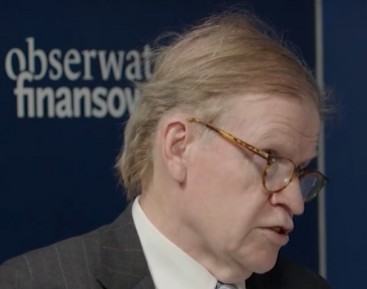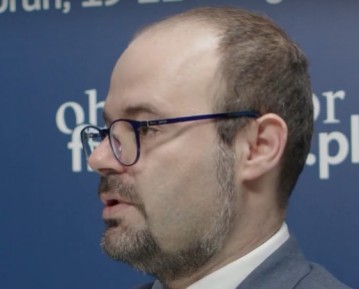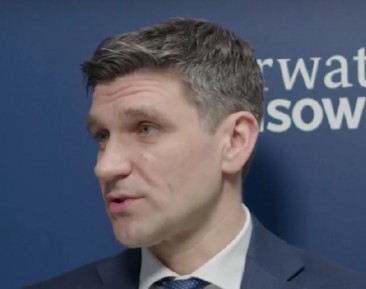Harold James: New wave of globalization is the aftermath of supply shocks
Category: Wideo
Obserwator Finansowy: I’ve found your 15 cautiously optimistic predictions for 2023 and I thought I would try to challenge this optimism where I can. Let’s start with Ukraine. What is the basis for your belief that the war is moving towards an agreement later this year?
David Marsh: Clearly, nobody knows and nobody can look into the mind of Vladimir Putin, either. And you could construct some pessimistic arguments but I also think there’s some reasonably optimistic assumption one can make. One is that Putin certainly isn’t winning the war at the moment and he’s not necessarily losing it and therefore when you’re in a position of some inferiority it might give him a position in which he has to go back to some fallback solutions. Secondly, I think that the Republicans in Congress in the United States will not have a totally blank cheque to give to the Ukrainians, Mr Zelensky, however brave and resilient the Ukrainians have been. There’ll have to be a stop at some stage to the flow of armaments. Not at the moment, and therefore there could be some levers that the West could use on Ukraine to bring them to the settlement table. Thirdly, I do think there has to be a rapprochement between China and the United States as guarantors of some kind of peace settlement. So those things could be moving into some type of constellation. The Chinese are looking for friends now. And they may find that they can team up with the Americans despite all the other setbacks we’ve had recently. So those are my three reasons.
OF: But let me quote you the NATO Secretary General who said “We don’t see any signs that President Putin is preparing for peace. We see just the opposite – he is preparing for another war, new offensives and new attacks.” Russia is now moving towards a 1.5 million army just to control Donetsk and Lugansk? Maybe they will go further?
DM: Clearly, there are no signs of Mr Putin weakening whatsoever and he’s got this mobilisation campaign, the so-called “meat grinder” tactics and because it’s a totalitarian state with a lot of state power, there is no massive unrest or opposition in the population, but I think at some stage the message will get across in the Russian population that this is a meaningless war which cannot lead to full-scale Russian victory, a reassertion of Russian imperialism back to the time of the tsars. So sooner or later this message will get through. It may not be any time soon, but of course, these things sometimes can come very quickly against all the assumptions. So there’s bound to be surprises. I’m just hoping and postulating that they may be positive surprises rather than negative ones.
OF: So how do you envision possible peace agreement? Ukraine easily gives up 18 per cent of its territory and Russians easily suspend all attacks? Is it possible?
DM: It certainly cannot be a settlement based on the status quo in Crimea or in the Donbas. But it will have to be a guaranteed settlement I think for Crimea whereby the Russians will have to have some rights over Crimea. We’ve had cases like this in the past over last 200 years where you have some states being protectorates or they come under international guarantees. It doesn’t always end well as we know from the case of Palestine. It’s going to have to be an area where the Western Europeans or the European Union together with the United States, together with China are dealing with Russia and Ukraine in a sensible grown-up, adult fashion. Now all of those things sound a bit improbable when you start to think about Putin and Zelensky sitting down together at a negotiating table, but I cannot envisage that that is totally impossible. And therefore I think in six months the situation may look, again, a little bit more hopeful. It could again, if you want to look at Armageddon, it could look very hopeless too but I’m postulating that there will be some reasons for optimism rather than pessimism in six months.
OF: My next doubt concerns China. You write that China will support the winners of this war, and it won’t necessarily be Mr Putin, but it’s hard to imagine China cooperating with the US. The difference of interests regarding Taiwan is, I think, probably too serious.
DM: I said that China will not want to be on the side of the losers. That’s not quite the same as saying “supporting the winners”, but China will want to be supporting a side that does not lose. And it’s clear that President Biden with his initiative to really stop the flow of excellence in technology for the advanced semiconductors… This decision he took in October that has been quite a master stroke, I think, in terms of telling the Chinese that they’re going to have to get very real when it comes to their economy. It’s also helpful and useful that President Xi has declared an end to the zero-COVID policy, opening up the Chinese economy again. That’s a sign China wants to get back onto the world stage in some way. Now, clearly they were not going to give up on this everlasting friendship with Russia. On the other hand, they’re going to have to work with the Americans in the area of money, technology, industry, so why shouldn’t they work with the Americans in the area of strategy? Just in the last few days we’ve had a rather empty and slightly hollow announcement from the Munich Security Conference from the Chinese key diplomat about a peace agreement which could be on the basis of the present position. That clearly is not acceptable. But it’s useful that the Chinese are coming forward now with some ideas. So let’s work on those ideas, let’s take the Chinese at their word, let’s see if they’re serious here. Let us work together with the Chinese to see whether we can come up with some sensible formula.
OF: Let’s move on to the economy. Can we already be confident that the ECB and the Fed will succeed in soft landing? Let’s define the task as getting inflation under control without triggering a major recession. Many economists say that after the inversion of the bond yield curve a recession is almost certain, but maybe later in 2023, maybe in 2024. What do you think about it?
DM: A lot of economists have been predicting a recession in the United States for some time and it’s quite clear the economists, once they’ve made a prediction, they like to stick to it, don’t they? They don’t like to say “I got it wrong”. I have thought ever since last summer, so now for getting on for a year, that the gloomy predictions about America were unfounded, and it was just an instinctive view that the American economy is very resilient. It’s also managed to put up with a strong dollar. Maybe the technology flow to the American companies has been bigger and more resilient than we have thought. So far the Fed tightening has not had such a major impact on the American economy as many had thought, and it could be that Fed will have to go a little bit further. Everybody’s been very lucky with the mild winter and also Europe in particular has taken some very good measures to enhance the diversification of gas supplies, but the big clincher has been “General Winter”. We know the old cliché “General Winter wins wars”. Well, General Winter has been very mild and that is a big factor in inflation coming down arithmetically. So I think sometime over the next two to three years we will be coming back towards the two per cent. It will not happen overnight and the central banks are going to have to be flexible. Clearly, if they came in now to knock inflation on the head and get it back to two per cent, then we would have a recession, but central bankers are going to have to pay some attention to supporting the overall economy rather than slavish attention to price stability. Central banks are political instruments, they are not totally independent and therefore they’re going to do the right thing by keeping the economies going. Both in the United States and in Europe.
OF: So a soft landing is possible?
DM: It is likely. I think it’s happening already. I have never thought that a hard landing is likely given all the other big problems we have in the world. The last thing the central banks want to do is to engineer a recession just so they can get inflation down to two per cent. Really, they’re not that stupid.
OF: During our last interview you reassured us that we are not faced with the danger of deglobalisation. However, what is the source of this certainty? To me it seems that it’s about the primacy of business over politics because, I imagine, after all no one responsible to shareholders will say “we are moving out of China to make less money.” Is that actually what is this is all about?
DM: I don’t think anybody’s thinking about moving out of China, but people are thinking about not putting so much money into China. So the flow of resources, flow of investments into China is slowing down tremendously. But that’s not adding up to de-globalisation, because the money or the investments are going to other countries, satellite countries around China – Vietnam, Indonesia, other countries which seem to have a more open and more competitive atmosphere. So, China’s loss will be the gain of other countries in Southeast Asia. I believe that the amount of money that EU firms invested in China in terms of net money over the last 20 years has been more or less the same as EU firms invested in America in terms of net investment in just one year. So, without a doubt, the flows into China are slowing down but that’s not deglobalisation. That’s simply, to take your point, business over politics. Business is behaving in a rational sense, but it’s not withdrawing into smaller areas. It’s just covering the ground in a different way.
OF: Yes, but we’ve heard also about “friend-shoring”. That we trade only with the partners whose political views we share. For example, that will be the West, the US and the EU. Is “friend-shoring” a thing? Does it have a future?
DM: Well, that’s just a slogan, isn’t it? Countries have always tried to use trade as a political tool.
OF: That’s just more expensive than doing things in China.
DM: It might be or it might not be. I mean, if you think about the net costs of building plants in China given the fact that quite often it’s difficult to get the money out of China, or it may become so in the future, then, the cost of doing business in China may suddenly be bigger than you think. And also, if you are doing business in China and you suddenly become threatened by sanctions then, clearly, that’s an additional cost. So business is rational, business will do what the shareholders are guiding them to. But the politics and the business people, I think, are going to be acting in one direction, which is to say “we want to do investment in places that we can trust, in places where we think the rules of law will still apply in 15 or 20 years.” So, this name, I don’t like the word “friend-shoring”, it’s just a slogan, it simply means doing business in places where you establish a set of rules that you think are reasonably likely not to be broken over the next 15 to 20 years. That’s all it means. I don’t think anything has changed just because Janet Yellen dreamt up a new word. She’s actually simply describing a state of affairs that has always existed.
OF: And finally, let’s talk about the consequences of Brexit. I heard the word “Bregret”. Do the British people regret leaving the EU?
DM: There’s no such thing as “the British people”. Don’t forget the whole coalition of different interests ranged on the side of those who wanted to leave the EU, the vote was only 52 to 48 percent with a turnout of about three quarters. So, clearly, the majority of the electorate either didn’t vote at all or were voting to stay in. I would imagine if you had a similar referendum now there would be a small majority in the direction of going back again. But I don’t think that’s likely to happen. You’re right, some people who did vote to leave, I was not one of them, do now regret it because they say the government lied to them over a whole series of different issues which is absolutely true. Everybody knew they were lying at the time. It didn’t actually put people off for voting for leaving the European Union. You could say the people who voted for it deserve the consequences. Because a lot of the people who voted for it are actually living in parts of the country which have been most hit by the effects of leaving the European Union. But I would take a more statesman-like view and I would say in the next 10 to 15 years Britain is going to have to get back to trading again with Europe on terms that make sense for Britain. It’s much more difficult to opt into a system if you’re outside than it is to opt out of a system if you’re inside. So, the British people have made a really difficult case for themselves. But I think with a new government, likely, from the end of 2024 onwards, I do think that Britain can do a lot to have a rapprochement with the EU without necessarily having to go fully back into the European Union.
OF: So, is “Bre-back” possible in 2038?
DM: Well, I don’t know what’s going to happen in such a long period of time but there will be a rapprochement. We’ve gone through the low points now, we’ve gone through two very poor Prime Ministers, Johnson and Truss. And whatever happens after that can only be for the better. Rishi Sunak is doing a good job now. Unspectacular, he’s beset by all kinds of problems, both within his own party and in the economy. The leader of Labour, Keir Starmer, who I would expect to see as the next Prime Minister, is a fairly moderate sort of person, not particularly overwhelming. But the British people have had enough of rather exotic characters and I think they would like to have somebody who’s underwhelming, perhaps a bit boring. A lawyer, and a person that other countries can trust.
OF: Thank you very much.
DM: My pleasure.
The interview was conducted on 20 February 2023


